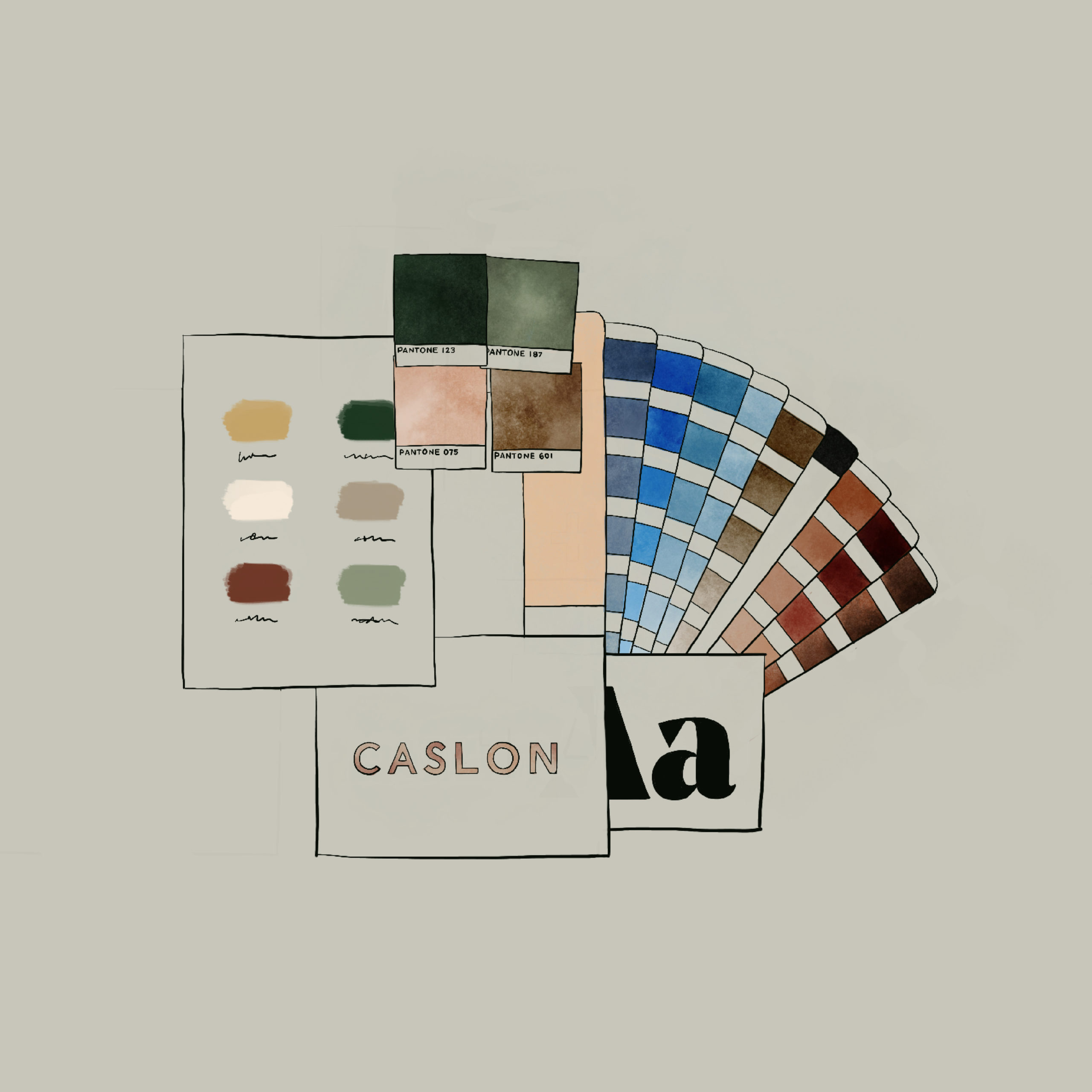Welcome to part nine of the Enneagram series, and our final number! If you are a Type Nine, this post is meant to offer some clarity into your personality and ideas for improving your work life. If you are not a Type Nine, chances are you know one. My hope is that this gives you greater compassion and appreciation for the peacemakers in your life.
In this series, we have been heavily referencing The Modern Enneagram, which was one of the options for #dropcapbookclub on Instagram. You can grab a copy of The Modern Enneagram on Amazon, which will give you additional thoughts and insights into your type and how it plays with others.
We’re going to focus on each personality in the context of a work environment. Our lives are incredibly complex, and The Modern Enneagram explores family dynamics, romantic relationships, and personal development, but we won’t be exploring those issues in this series.
In each type’s post, you’ll learn:
-
YOUR CORE MOTIVATION
-
HOW TO HANDLE STRESS
-
CREATING THE RIGHT WORK ENVIRONMENT
The Modern Enneagram starts with a story of “Julia” (who is a Type Seven) and I found it extremely helpful in understanding how the Enneagram model might be applied to a real person. So let’s start with our own story of a fictional Type Nine named Elizabeth. Keep in mind that the point of this story is to notice the patterns of motivation, not the specific circumstances or behavior.
“Elizabeth is a 28-year-old therapist living in a mountain town. Shortly after finishing school, she moved into a modest bungalow where she could enjoy the fresh mountain air and live an active lifestyle.”
We’ll use Elizabeth as an example of a Type Nine as we dive into the deeper personality and core motivations of this type.
The Sleeping At Last “Nine” song has not yet released. I will link to the song and podcast here as soon as it becomes available.
Core Motivation
Motivation – to have peace and harmony
Basic Fear – fear loss and separation from others
Growing up, Elizabeth was the middle child of a large family. Often thrown in the midst of sibling rivalries and family drama, she learned to navigate the complex emotional needs of her family in order to keep the peace. In college, her parents went through a divorce, and Elizabeth was the rock for her sisters. During the process, she began to realize just how much she enjoyed creating opportunities for harmony and reconciliation. She also noticed that her friends came to her for advice, and that she not only knew how to help, but could easily understand the other side. After switching her major to therapy and studying family dynamics in depth, she has created a career where she can help other families during divorce and learn more about her own family in the process. She often tells others that her journey becoming a family therapist has been the greatest blessing in processing her own emotions.
Elizabeth’s Unfolding Story
Elizabeth’s calm demeanor and desire for peace has made her an effective family mediator. She has the innate ability to enter into any conflict and find the common ground. She patiently listens to her clients, empathizes with their emotions, and gently directs them in a path towards growth. She’s not one to enjoy sitting in resentment. She’s able to make each person feel heard and understood, a gift that has brought her a solid reputation in her community and a calendar full of appointments.
When Elizabeth’s clients are willing to do the work to pursue harmony in their lives, she truly enjoys her job. It makes her feel so fulfilled when her clients genuinely take her advice to heart. Through her career as a therapist, she feels she is able to bring just a little more peace and harmony into an otherwise sad world.
But when she comes across disrespectful and abusive clients, she has a particularly difficult time maintaining emotional distance from her work. Feeling unfairly blamed and thrown in into unnecessarily hostile situations, she begins to withdraw and fear that she will not be able to make a difference. It becomes nearly impossible for her to leave her personal emotions out of the situation and maintain her own balance as she works through intense family trauma.
If left unchecked, Elizabeth will begin to repress her emotions and neglect herself. In an attempt to numb negative reactions, she’ll begin to disassociate from not only her work, but her own life. Fearing her own downward spiral, Elizabeth with begin looking for anything to hold on to, and can allow her patients to project and manipulate her into adopting their unhealthy and aggressive points of view.
Stress
In states of stress, Nines take on the characteristics of an unhealthy and anxious Type Six. Fearing conflict and disruption in their relationships, complacent Nines become disengaged and stubborn towards others.
When stress progresses, they become neglectful and disassociate from those who seem to be causing conflict. Shutting down, they can begin to detach from the world and neglect themselves.
how to counteract stress for a type nine
1. Notice that you tend to go along with others without expressing your own thoughts and desires. It is impossible to love others when you don’t let them see the real you.
When Elizabeth is working with a particularly aggressive client, she can often feel nervous to express her own opinions. However, she has learned that it’s important for her to speak truth to others, even when it’s uncomfortable. Instead of mindlessly agreeing with more assertive personalities, she takes a moment to make sure that her words are a reflection of her true feelings.
2. Force yourself to pay attention to what’s going on and what people are trying to say. Stop escaping into your daydreams to avoid difficult conversations.
In her early days as a therapist, Elizabeth noticed that she would drift into daydreams when her couples got in particularly heated arguments. Instead of escaping intense emotion, she now makes it a point to listen closely when intense emotion arises, looking for the underlying problem instead of escaping the conflict.
3. Do the work to deal with your negative emotions. When you avoid your anger and sadness, you just leave room for it to grow between you and your relationships. Get it out into the open.
When Elizabeth is dealing with a particularly painful client situation, she now makes it a point to see her own therapist a few times throughout the week. She has learned that she must deal with her own emotional baggage so that she can leave out her personal bias when working with others.
4. Examine how you have contributed to the problems that exist in your life, especially between people you love. It’s important for you to actively examine where your closest relationships that ended in separation went wrong.
When clients spark a particularly strong reaction in Elizabeth, she takes a few days to sort through her own issues to see how she may negatively associate certain personality traits with “wrong” behavior. She acknowledges her own involvement in the conflicts she experienced in her life, makes appropriate efforts to reconcile, and uses it as a tool for helping her clients when they encounter similar situations.
5. Regular exercise is important for helping you to become aware of your feelings. It’s also a good way to release anger and aggression.
Elizabeth has begun going on a quick hike behind her office in the evenings after her last meetings to clear her mind and release any emotional stress she may have picked up on throughout the day. By taking care of her body, she is able to ground herself in reality and release the idea that she must personally fix her client’s problems.
Work Environment
The most important thing for a Type Nine to experience at work is harmony. As a Type Nine entrepreneur, it is crucial that you bring people together in your small business, even when they seem to have nothing in common. Here are three other ideas for incorporating your Type Nine strengths in your business:
-
Start by honestly evaluating how much your products and services are worth. Hire a business coach, assemble a focus group, or join a mastermind as you build your products and services to make sure you don’t devalue yourself.
-
Done is better than perfect. Beware of projects and tasks that stay on your plate for too long. Keep things moving!
-
Go through your whole business process. Write down the parts that are most important to you. Communicate them to your customers to give insight into your motivation and personal preferences. This will create a more meaningful dynamic.
When we first met Elizabeth, her desire for peace made her an empathetic and effective family counselor. Her ability to understand multiple points of view made it easier for her to create opportunities for reconciliation among broken families. As a therapist, she has the opportunity to cultivate harmony in her world and show others that peace is possible. However, when she encountered abusive clients, she began to withdraw from the situation in an attempt to maintain her own emotional balance and inner peace.
By gaining a deeper understanding of herself and how she handles stress, Elizabeth will be able to keep her own peace when conflict arises. Instead of retreated into her mind and disassociating from her current reality, she’ll be able to get to the other side of conflict while staying true to herself. She has learned that often people must go deeper into their pain in order to get to the other side, and by walking through it with them, she can lead them to the other side.
Although Elizabeth will always struggle with certain aspects of her job as a therapist, she has become less afraid of conflict through her experience. She is dedicated to her evening walks, sees her own therapist regularly, and allows herself the space to deal with her own negative emotions and experiences. She prioritizes her own health and balance, knowing that her clients need her to be the healthiest version of herself in order to give them wisdom in their own lives.
It turns out that her innate desire for harmony is the primary reason that her clients turn to her in seemingly irreconcilable family situations. By keeping the perspective that things typically get worse before they get better, she has developed patience with the healing process. It turns out that her willingness to listen to the difficult circumstances her clients go through is the key to helping them see the silver lining and way out. By approaching conflict with a healthy perspective, Elizabeth is able to contribute more than positivity, she is able to truly heal her community.
>
“How do you like this new series? Do you identify as an Enneagram Type Nine? Comment below with your own story!”




I’m a nine and this hits the nail on the head!
I’m so happy to hear that! Nines make such wonderful friends 🙂
I am a nine as well as a therapist and this is exactly what I am dealing with.
I am 24 year old male 9 that has had so much happens to me but reading this makes so much to me certain behaviors and desires I have ; being attracted to nature and why after I stopped playing sports or working out during college I felt more sad or that my emotions couldn’t be moderated. I studied social work but recently I thought I would like to just be just clinical without the connecting of resources but I always felt I wasn’t healthy enough of a 9 to do it..this gives home thank you for posting…